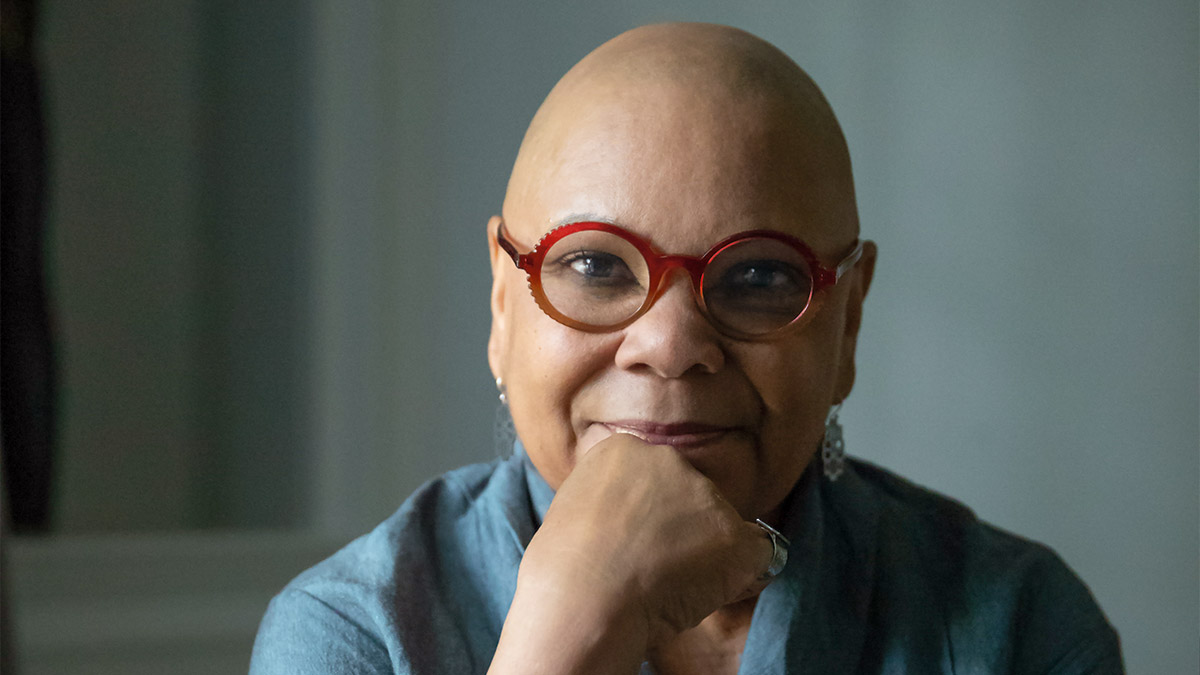As a Black woman born and raised in these United States, I have spent much of my life not just angry, but rageful. It’s the kind of rage that finds me gritting my teeth until my jaw aches even as everything around me seems perfectly safe and serene.
There’s a difference between anger and rage, says Ruth King, a beloved Insight Meditation teacher, the author of Healing Rage and Mindful of Race, and the founder of Mindful of Race Institute. “Anger is primarily associated with a current injustice, dislike, or disappointment”—a driver cutting you off in traffic, a disagreement at work, for example. It’s an emotion that arises for a set amount of time and is usually directed at a particular incident or person. Rage, on the other hand, is accumulated anger. It’s prolonged, extending beyond any one moment. It is, King says, “primarily physical and rooted to unresolved or unknown traumas that shamed us in childhood.”
How many of us, because of our gender and/or race, have been subjected to assaults on both the “micro” level and the macro level? How many of us have had our childhood innocence stolen by members of our families or strangers who could not face their own rage and sense of helplessness, or by people of other races who felt it necessary to vocalize what they thought of us and “our kind”? King’s work helps us understand that the aggressions leveled at us are symptomatic of what she calls “a disease of the heart.”
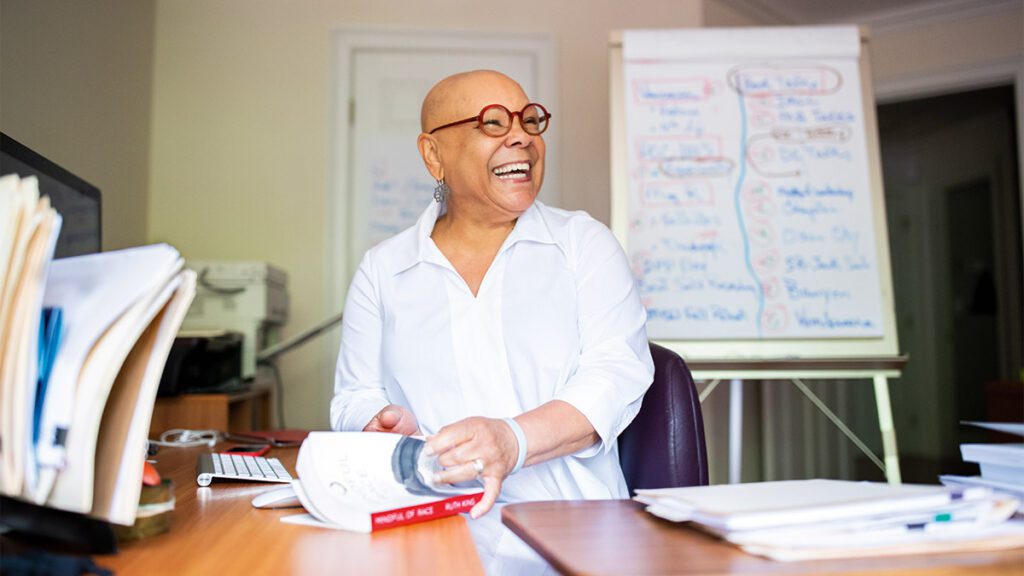
Ruth King graciously finds time between moving homes to talk with me online—her face softly lit by the afternoon sun streaming through her window. Although we’re miles apart, with King in North Carolina and me in Michigan, she creates an atmosphere of intimacy in the openness with which she shares stories from her life. These stories show what a gift of mindfulness is on the path to individual and collective healing.
“Mindfulness teachings support a decolonizing of our conditioning so that we can be in relationship to anything that arises in our minds with a wise heart. Meditation is the practice for understanding it,” she says.
“What if we’re all kin? What if, in some past life, everyone was once a beloved?”
Mindfulness is profoundly effective for liberating the mind, and it’s supportive in transmuting trauma to the degree that one is capable of reflecting on the present-moment experience, not the story our mind weaves or the concepts we use to describe our experience. King says that if we’re activated and can’t look inward at what’s happening, then we need to create space between ourselves and what has activated us. Mindfulness meditation practice can offer us access to stabilization so that we can find some distance, understanding, and ease.
King has learned from experience that “sitting down and being able to develop an inner capacity to witness one’s mind is a gamechanger.” This witnessing helps us change our relationship with our habits of mind around race—the stories that arise and get replayed over and over. Mindfulness enables us to see how thoughts and emotions arise, how they pass, as well as the fact that things happen in life that we can’t control. All of these mind-states can be understood through the Buddhist teachings on the three characteristics of existence, anatta (no self), anicca (impermanence), and dukkha (suffering), or as reframed by King, “Not personal, not permanent, not perfect.” Our capacity to be with the nature of our experiences and dance with it is what King finds liberating.
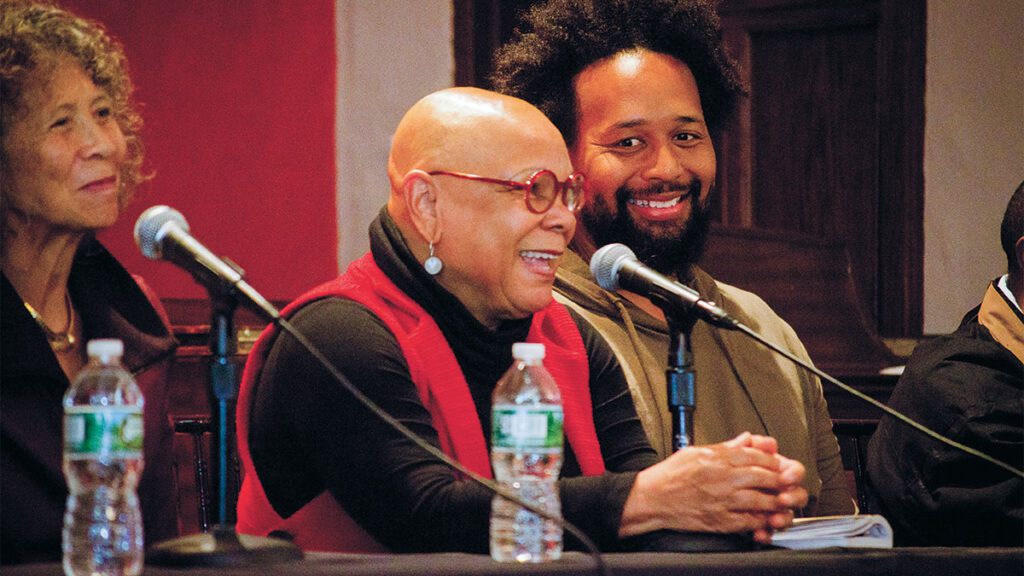
“With mindfulness we can ask ourselves what’s happening. We can move in a little closer and examine the experience of what’s happening,” she says. This is an important point because it speaks to the inward reflection that allows us to feel into our fear or anger and then open more deeply to experience the jewel of compassion, which is needed if we are to heal.
As King explains, “compassion is the wish that everyone, without exception, is free from pain, suffering, and its causes.” This includes having compassion for one’s self, something that many of us have difficulty with. But as King counsels, compassion acts as an anticoagulate to the burden that racial suffering places on the body, heart, and mind. It’s only right that we offer this ease to ourselves as we offer it to others.
King, who considers herself a heart activist, founded the Mindful of Race Institute in 2020. The mission of the institute is to foster racial healing and relational well-being through contemplative practices. At the heart of her work is the Online Academy, a platform designed to elevate racial awareness, leadership, and social responsibility. A firm believer that racism is a curable heart disease, King guides learners in unraveling conditioned responses and embodying diversity, equity, and inclusion. Her starship program, Brave Space, offers a yearlong immersion for racial affinity groups, challenging ingrained perceptions and fostering racial insight. She emphasizes the importance of self-awareness and relational rigor, acknowledging that sustained shifts toward racial equity demand collective growth, understanding, and wise leadership within supportive community.
Even if we don’t fully realize the racial healing that we seek in our lifetime, the work participants do in Brave Space plants the seeds for generations to come. As we live and work in a country that has refused to face its foundational legacy of racial dominance on which it was built, such work is revolutionary and necessary.
King, in opening her dharma talks, often asks audience members to turn to each other and say, “You belong to me, and I belong to you.” One dharma talk I attended, she opened by joyously proclaiming, “You’re all mine, you know!”
This is King’s way of calling for us to recognize our interrelatedness and interdependence. We’d all do well to ask ourselves: What if we’re all kin? What if, in some past life, everyone was once a beloved?
Such a query opens the heart, which as King proposes, “allows us to touch into a certain humanity in all of us, so utterly imperfect and amazing at the same time.” Such a query also leads to deep self-inquiry. As contemplatives, we may also ask ourselves and each other, what is our endgame? Is it personal healing? Collective well-being? A vision of racial harmony or an end to one’s immediate crisis? It’s not so much about the answers we arrive at, but more about the questions we ask.
King teaches that our intent is embedded in our belonging, and racial harmony is an aspect of belonging. Belonging is inextricable from an embodied spiritual practice; it’s not just intellectual. She emphasizes mindfulness practice as a daily way of keeping one’s heart in alignment with whatever one’s aspiration is toward collective well-being.
For Ruth King, music and dance are her go-to sources of joy. She often offers the gift of song as part of her dharma talks.
Music is therapeutic for King for many reasons. One is that, despite all of the childhood trauma she experienced, she also has wonderful memories of improvisational jazz jam sessions that were held in her home on the third Friday of every month. Even though as a child of ten, she and her younger sisters could not attend, they were able to enjoy the music through their partially open door.
King talks of her love for dance as medicine. She talks about the fact that, while dance is a universal form of expression, African American dance is an expression of our African inheritance of movement as greeting, “a drumbeat,” where words proffer more than simply an acknowledgment of another’s physical presence. It brings into focus all that goes into making up the being in front of us. “It’s what’s special about our way of expression,” King says.
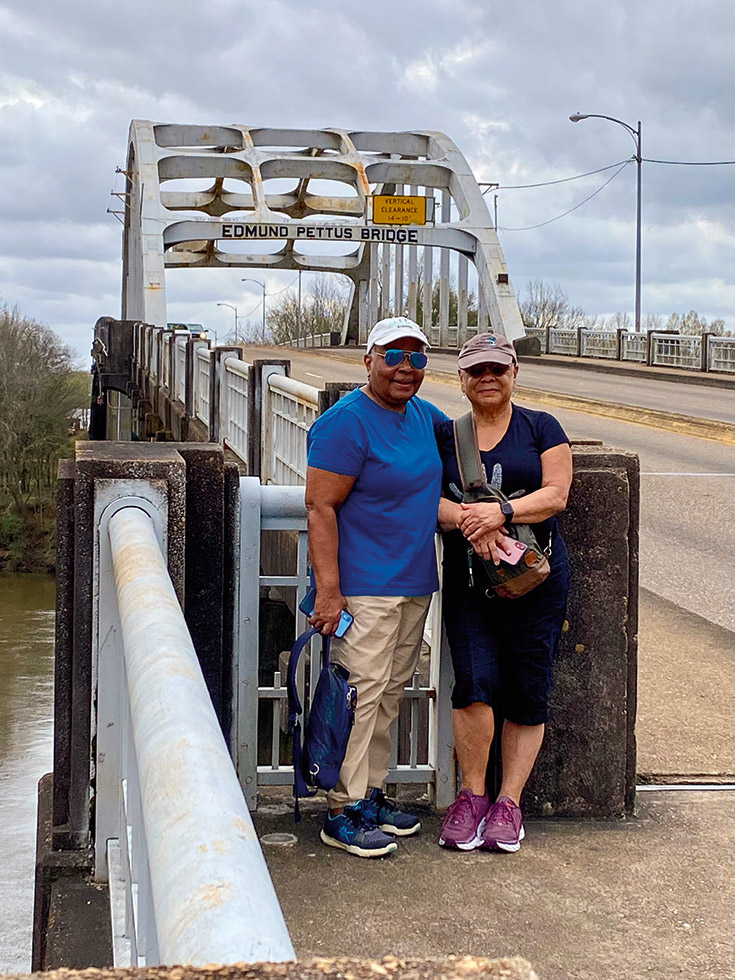
When King speaks about how hip-hop artists use their whole bodies to express themselves unapologetically, it’s clear that she sees healing ourselves as part and parcel of the time-tested power of movement. Physical movement enables us to surface some of the energy that gets lodged in the body when we suffer traumas that give rise to the rage that can unconsciously dictate our thoughts and actions well into adulthood. Understanding movement’s power to heal, King spent more than fifteen years leading Celebration of Rage, a ceremonial and ancestral retreat for women to experience emotional release through dance, sound, and vibrational music, allowing us to open, rest, and reclaim our bodies.
King also uses song as part of her practice. Song, she believes, is rooted in the spirit of generosity. It’s a natural flow of an expression of freedom that isn’t tied to approval. In speaking about her turn to song, King recalls her early experience with the Pentecostal church and the way that the community made space for people to express themselves in movement and sound.
As someone who also spent part of my childhood in the Black church, I can attest to that space-making. Indeed, during service, when Spirit inevitably begins making itself known, not only is space made for it to come through, but a container of safety and care is created so that freedom can be found in its full expression. King’s experience with such witnessing helped her understand that her job as a dharma teacher is to trust what’s moving through in those moments and to dignify them by giving them space and voice.
As in the church, the “vibrational medicine” that King offers cuts through formulation. As we know, the body keeps score of our hurts and traumas. In safe, sacred containers, it is able to release what is held. “In such spaces we can trust that what we put out into the world will be met with heart,” King says. The sharing and witnessing are reciprocal. Those who share are healed, and those who witness the sharing also heal. This is sangha.
King is careful to note that there’s a form to how Buddhist teachings are classically transmitted, and that amongst African Americans, this form is not ignored. Rather, the roots remain and, because of our experience of control and circumscription in this country, when Black folks practice, it is “our impulse to stretch and flex and check in for ourselves,” says King. When we do this, she continues, we discover, “what form most dignifies the expression that we most need in order to access our liberation.” This approach is in keeping with the Buddha’s teaching that we should see for ourselves.
While we may ask ourselves whether altering the form is allowed, says King, “we should also ask what happens if we bring in song? What’s the consequence beyond the delight of a surprise or an opening of the heart, softening into a moment that allows for a deeper investigation. In our Black bodies we get to do that.”
For those of us who are reticent about disturbing the form most often associated with Buddhist teachings, we might reflect on the promise of the dharma: to help us find freedom from suffering. For people of African descent living in this country, it makes perfect sense that right practice incorporates our life-sustaining inheritances of music, song, and dance.
The Venerable Zen monk Thich Nhat Hanh wrote about the rightness of the kind of work that teachers like King are doing. “Buddhism is like a tree that is constantly growing and adapting to the new lands and cultures it is brought to,” he once wrote. “For the Buddha’s teachings to stay healthy and vibrant, we must constantly renew and update them so that they remain relevant and effective for the increasingly diverse communities that practice them.”
At the March 2023 BIPOC Voices sangha hosted by Spirit Rock, Ruth King’s dharma talk, “My Civil Rights Journey and the Power of Sangha,” was centered around the sojourn she’d just taken with her wife to key Civil Rights sites in the South.
As she described it, in Montgomery, Alabama, they went to the Legacy Museum and the National Memorial for Peace and Justice, also known as the Lynching Museum. For King, making her way through the displays at the Legacy Museum brought into relief the context of history in relation to our current circumstances; the way that the Legacy Museum is laid out is a journey from slavery to mass incarceration, showing us how the past is still present in the systems that uphold the legacy of slavery.
Following her walk through the National Memorial for Peace and Justice, King was able to find some respite in the Memorial Garden and reflect on the ten paramis (perfections) in relation to our African ancestors and the gifts they bestowed on us as their descendants. As King sees it, the parami of generosity is found in our ancestors’ decision to continue living so that we might be, and the parami of virtue, or moral integrity, “can be found in the unfathomable faith that they must have held onto in those darkest of times.”
After giving everyone in attendance at the BIPOC Voices sangha time to breathe and reflect on all that she had shared, King described how she and her wife went on to Birmingham. There, driving around town, they were stopped by police who claimed King had run a stop sign. Although she believed she had not, King was forced to defer to the police. She talked about being traumatized and unmoored by the encounter.
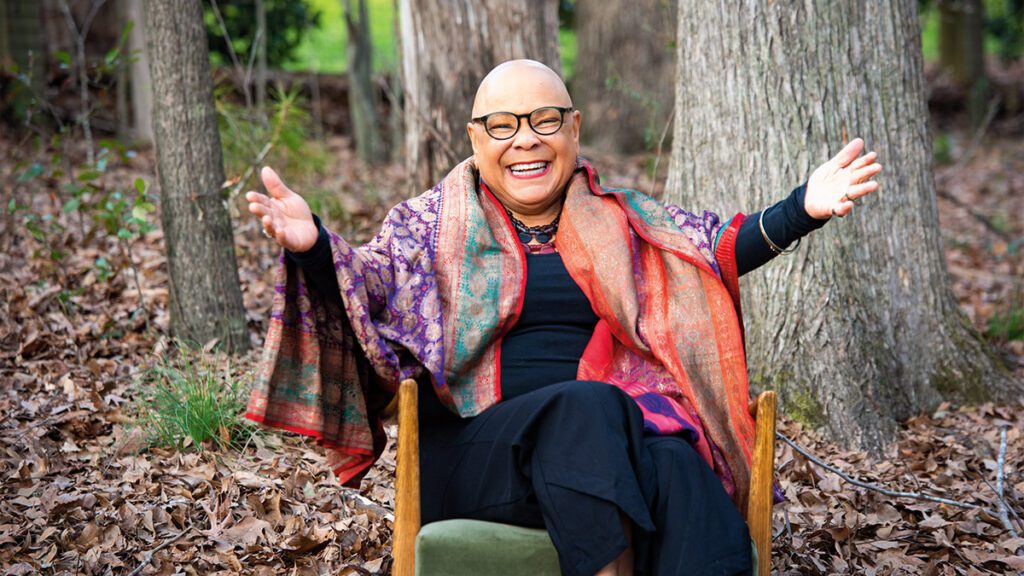
Everyone in that room knew exactly what she meant. There was a palpable collective holding of breath until she told us that she and her wife were allowed, with a warning, to continue on their way to the guest house where they were staying for the night. Once there, they found a garden where King grounded herself. In such a difficult time, King was grateful to be able to turn to her practice. That’s what carried her, she says.
To illustrate the value of practice, Ruth King often tells the story of a run-in she had with a white male passenger sitting behind her on a flight from South Africa to California. Looking forward to getting some rest on the long flight, King reclined her seat. In short order, the man began slamming his food tray against the back of her chair. King responded by asking him if he’d be willing to stop the action. His reaction was to yell at her so loudly that, in King’s mind, the whole plane heard his disrespectful words to her, a Black woman. This was one of those times when she had to call on her mindfulness practice to keep the peace.
Several years ago, when I first heard King give a dharma talk about this incident, I’ll admit, I did not understand her ability to hold it together, to not explode with rage. After all, she’d paid her fare and should have been able to rest on that long flight. There was also the issue of white male privilege being deployed even though, as King says, the incident was not overtly about race. While I could see the wisdom in her calm response, as a Black woman with my own incidents to build stories around, I outright rejected it. Now, after many, many hours of mindfulness practice, my heart is beginning to soften around such encounters. With compassion as a guide, I’m beginning to see the innocence of those who behave out of ignorance. Like King, with equanimity as my foundation, I know “my freedom and well-being are not dependent on anyone’s behavior going my way.”
Rarely does enragement bring healing relief. As King shares, “Rage is initiatory, not transformative.” Equanimity, according to King, is a sustained state of balance with a mind that is “touched by life but unbroken by its ever-changing nature.”I continue to work on my anger and rage as well as the fear that I’ve come to recognize as the source of those emotions. Sitting with King’s books, in beloved community with her, and most recently, in conversation have greatly supported my personal healing. As King describes it, it is mindfulness practice that brings me in alignment with my aspiration to contribute to our collective healing.
